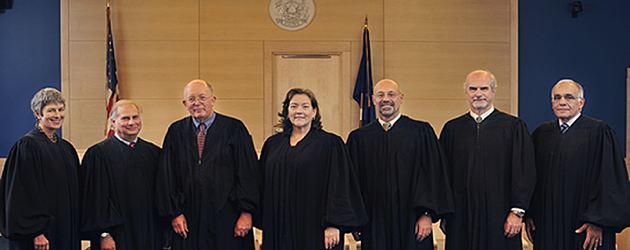 By: Lisa Keen/Keen News Service—
By: Lisa Keen/Keen News Service—
In an historic first, a state high court ruled yesterday that a male-to-female transgender student who was accepted by school staff and students as a girl could not be barred from using the girls’ bathroom at school.
Jennifer Levi of Gay & Lesbian Advocates & Defenders (GLAD), which brought the lawsuit on behalf of the girl and her parents, called the decision in Doe v. Clenchy a “huge breakthrough” for transgender young people. GLAD also noted that the decision marks “the first time a state court has ruled that transgender students must be allowed to use the bathrooms that match who they are.” [pullquote]Saying it had to enforce the law “without regard to the public’s potential discomfort with the result,” the 6 to 1 majority said that segregation or separation is a form of discrimination.[/pullquote]
“This ruling is an important breakthrough for transgender students,” said Mara Keisling, executive director of the National Center for Transgender Equality. “Schools have a desire and responsibility to make schools safe and welcoming for all students. And this ruling helps schools meet that mission. In fact, this is consistent with what educators and human rights commissions around the country have concluded. Trans girls are girls, trans boys are boys and schools that understand that will better serve all their students.”
GLAD took the appeal to the Maine Supreme Judicial Court on behalf of Nicole Maines (identified in court papers as Susan Doe) and her parents after losing in a state superior court. Their girl attended public schools whose staff and students seemed to be handling her transition well. Controversy erupted, however, after one boy — prompted by his guardian — followed Susan into the girls’ bathroom, claiming that he, too, should be allowed to use the girls room. The incident garnered considerable media attention and prompted school officials to require Susan to use a unisex staff bathroom. [pullquote]“Schools have a desire and responsibility to make schools safe and welcoming for all students. And this ruling helps schools meet that mission. — Mara Keisling[/pullquote]
The Maines filed suit, saying forcing Susan to use a separate bathroom violated the state human rights law against sexual orientation discrimination.
Saying it had to enforce the law “without regard to the public’s potential discomfort with the result,” the 6 to 1 majority said that segregation or separation is a form of discrimination. Noting that another state law requires school bathrooms be segregated by sex, the court said that policies concerning the use of those bathrooms must nonetheless comply with the state non-discrimination law. Given that the school staff and Susan’s parents agreed that Susan is a girl, wrote the majority, the school violated the human rights ordinance when it “treated [her] differently from other students solely because of her status as a transgender girl.”
The MAJORITY decision, written by Justice Warren Silver (appointed by former Democratic Governor John Baldacci), emphasized that Susan had obtained a diagnosis of gender dysphoria and that the school staff and her friends all accepted her as a girl.
“Thus, we do not suggest that any person could demand access to any school facility or program based solely on a self-declaration of gender identity or confusion without the plans developed in cooperation with the school and the accepted and respected diagnosis that are present in this case,” wrote the majority.”
What bathrooms transgender people use has often been trotted out as a major concern by opponents of equal rights for transgender people.
“Eventually, the obvious trend in law and policy to protect trans youth will make that an untenable strategy for fundraising or getting attention or whatever their goal is,” said Keisling. “But for now, unfortunately, this case, while decisive, probably won’t end their thoughtless attacks in our kids.”
© copyright 2014 by Keen News Service. All rights reserved.







